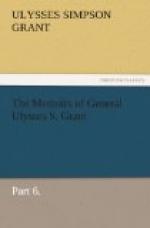Mr. Lincoln knew that it had been arranged for Sherman to join me at a fixed time, to co-operate in the destruction of Lee’s army. I told him that I had been very anxious to have the Eastern armies vanquish their old enemy who had so long resisted all their repeated and gallant attempts to subdue them or drive them from their capital. The Western armies had been in the main successful until they had conquered all the territory from the Mississippi River to the State of North Carolina, and were now almost ready to knock at the back door of Richmond, asking admittance. I said to him that if the Western armies should be even upon the field, operating against Richmond and Lee, the credit would be given to them for the capture, by politicians and non-combatants from the section of country which those troops hailed from. It might lead to disagreeable bickerings between members of Congress of the East and those of the West in some of their debates. Western members might be throwing it up to the members of the East that in the suppression of the rebellion they were not able to capture an army, or to accomplish much in the way of contributing toward that end, but had to wait until the Western armies had conquered all the territory south and west of them, and then come on to help them capture the only army they had been engaged with.
Mr. Lincoln said he saw that now, but had never thought of it before, because his anxiety was so great that he did not care where the aid came from so the work was done.
The Army of the Potomac has every reason to be proud of its four years’ record in the suppression of the rebellion. The army it had to fight was the protection to the capital of a people which was attempting to found a nation upon the territory of the United States. Its loss would be the loss of the cause. Every energy, therefore, was put forth by the Confederacy to protect and maintain their capital. Everything else would go if it went. Lee’s army had to be strengthened to enable it to maintain its position, no matter what territory was wrested from the South in another quarter.
I never expected any such bickering as I have indicated, between the soldiers of the two sections; and, fortunately, there has been none between the politicians. Possibly I am the only one who thought of the liability of such a state of things in advance.
When our conversation was at an end Mr. Lincoln mounted his horse and started on his return to City Point, while I and my staff started to join the army, now a good many miles in advance. Up to this time I had not received the report of the capture of Richmond.




